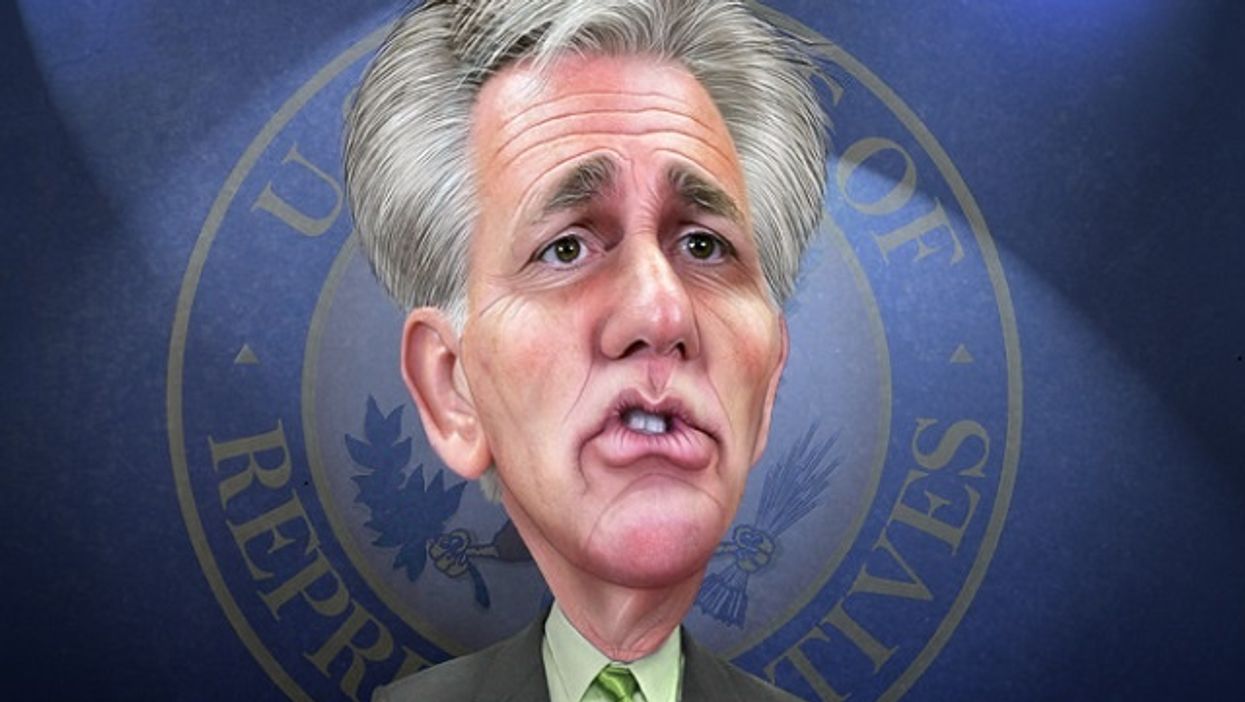Reprinted with permission from American Independent
The nation's most powerful business lobby has long been an ally of Republicans on Capitol Hill.
Now, that may be changing.
The U.S. Chamber of Commerce, which calls itself the "world's largest business organization," and aims to "advocate for pro-business policies," has spent $1.6 billion on federal lobbying — more than double the next largest interest group — and more than $116 million on political expenditures since 1998. But in recent years, it has shifted its rhetoric, embracing more bipartisanship and commonsense policy solutions, as citizens demand more social responsibility from businesses.
An October poll found 68 percent of Americans want corporate CEOs to take a stand on social issues. Another survey, taken last June, found nearly 60 percent want the companies they use to take positions on issues like social justice and racial discrimination.
After years of almost exclusively backing Republicans, the Chamber also backed 23 House Democrats last year. Since President Joe Biden's victory, it has embraced several of his policy goals, lending some support for his social policies and government actions to help people.
Republican leaders, many of them bankrolled by the Chamber for years, claim the organization has "sold out" and are disowning their longtime benefactors.
"I don't want the U.S. Chamber's endorsement because they have sold out," House Minority Leader Kevin McCarthy complained in a September Fox Business interview. "It is hypocrisy that the U.S. Chamber of Commerce would endorse the Democrats that are part of this socialist agenda that is driving this country out, and is fighting [Donald Trump]."
Senate Minority Leader McConnell told Politico at the time, "Honestly at this point, I think they're so confused about what they're about that they probably don't make much difference."
Earlier in February, Rep. Jason Smith (R-MO) toldPolitico the Chamber "has forgotten Main Street America" and must decide if "they really care about the bottom line of companies and small businesses and growth," or whether "they care more about social justice[.]"
Though congressional Republicans have taken millions from the Chamber's political action committee, relied on its massive outside spending, and bragged in the past of its support as a "pro-business" seal of approval, most have opposed its mainstream policy proposals and agenda.
That much was evident in January. Having already recognized Biden as the president-elect on the same day major news outlets projected him the winner back in November, the Chamber put out a statement on January 4 opposing efforts by congressional Republicans to overturn the results and declare Donald Trump the winner.
"Efforts by some members of Congress to disregard certified election results in an effort to change the election outcome or to try a make a long-term political point undermines our democracy and the rule of law and will only result in further division," the group said, urging Congress to "fulfill its responsibility" in certifying the Electoral College results, which sealed Biden's victory.
Despite its urging, 139 House Republicans and 8 GOP senators — a majority of congressional Republicans — voted to reject the election results on Jan. 6, the same day a riotous mob of pro-Trump extremists stormed the Capitol to stop that certification, fueled by GOP-led conspiracies about widespread voter fraud.
Overall, many congressional Republicans have moved far enough to the right that they are now mostly out of sync with the public, as well as the Chamber, an entity with which they long claimed to be allied, on a number of high profile issues.
Pandemic Relief
The Chamber of Commerce has embraced Biden's $1.9 trillion American Rescue Plan, specifically applauding its "focus on vaccinations and on economic sectors and families that continue to suffer as the pandemic rages on." It also endorsed Biden's mask mandate to curb the spread of the coronavirus.
The pandemic relief bill and mask mandate would both help slow the crisis, ideally allowing businesses to safely reopen.
By contrast, congressional Republicans have railed against the proposal as "wasteful" and, in early February, House and Senate Republicans voted unanimously against advancing it. Several Republicans have refused to wear masks in public and have sought to overturn mask requirements.
Meanwhile, a December STAT-Harris poll found 75 percent support for mandatory mask use in public.
A Navigator Strategies poll released Thursday found 73 percent of Americans back the relief package — and even 53 percent of Republicans support it.
LGBTQ rights
In May 2019, the Chamber endorsed the Equality Act, which would update federal nondiscrimination laws to explicitly protect LGBTQ Americans from discrimination. This came as part of a broader push for workplace inclusion, without regard for sexual orientation or gender identity.
But the Republican Party continues to fight against LGBTQ rights. When the House of Representatives passed the Equality Act that month, just eight Republicans voted for it — 173 voted against. Republicans then blocked it from even getting a vote in the Senate.
"Over 325 major businesses have joined HRC's Business Coalition for the Equality Act because they understand that equality is good for business," Beck Bailey, director of the Human Rights Campaign's Workplace Equality Program, said in an email. "In order to truly thrive at work, employees must be able to thrive outside of it. Employees and their families must have the uniform civil rights protections guaranteed to others to live unfettered by discrimination in other aspects of daily life."
A 2016 North Carolina law barring transgender people from using the bathroom matching their gender identity and blocking local nondiscrimination protections, for example, cost the state's economy billions after a national boycott.
"The Equality Act not only aligns with corporate values of fairness and inclusion, it just makes good business sense," Bailey noted.
A December poll found 70 percent support for the Equality Act — including 50 percent support among Trump voters.
Climate Change
After years of backing climate denial organizations and opposing climate action, like the Paris Agreement, the Chamber made a major shift in 2019. In what it has called an "update" to its approach, the group now says it embraces efforts to reduce climate change, including the possibility of a carbon tax.
Many in the GOP still deny climate change even exists. Opposition to the Paris accord is nearly universal among congressional Republicans and the party platform rejects both a carbon tax and the treaty.
Climate change is a huge threat to businesses, which are already feeling its negative impacts and recognize things could get much worse. A 2014 report to investors by Chipotle, for example, warned that extreme weather "associated with global climate change" may "have a significant impact on the price or availability of some of our ingredients," forcing them to stop serving salsas and guacamole.
A Pew poll last June found 65 percent of Americans do not believe the federal government is doing enough to stem climate change and 73 percent supported a carbon emissions tax on corporations.
Adam Beitman, Sierra Club senior communications strategist for federal policy, said in an email: "We know the costs of inaction are far greater than those tied to the opportunities of investing in a clean energy economy that works for all and tackles the climate crisis."
He noted however that the Chamber still had much to prove in its dedication to environmental efforts. "Unfortunately, the Chamber of Commerce has and continues to be one of the greatest roadblocks to significant climate action in Washington, D.C. rhetoric notwithstanding," he said.
Immigration Reform
The Chamber has thrown its support behind comprehensive immigration reform and the Dream Act, a bill to offer legal protections and a path to citizenship for Dreamers — undocumented immigrants brought to the United States as children by their parents.
With millions of skilled and educated workers and entrepreneurs hoping to become citizens, these reforms could provide businesses with their future employees and leaders.
A Vox and Data for Progress poll released this month found 69 percent of likely voters support a path to citizenship for undocumented people already in the country who can pass a background check and pay their taxes.
But few Republicans in Congress have backed immigration reform, even for Dreamers.
Bruna Sollod, communications director at United We Dream, said in an interview that the COVID-19 pandemic "really shined a light on the impact of all immigrants," showing how essential those workers area. She noted that Dreamers, protected by executive action, "are business owners [and] have jobs that keep communities thriving."
Minimum Wage
While the Chamber has historically opposed plans to raise the minimum wage, it has expressed openness to an "increase guided by economic conditions."
For the most part, congressional Republicans have opposed any efforts to raise the federal minimum — which has been stuck at $7.25 an hour since 2009. McConnell blocked a House-passed increase last year and has long opposed increases as "not the way to grow our economy."
But polls show wide public support for a higher wage floor. One recent survey of voters in swing House districts found 62 percent support for increasing the hours minimum wage to $15 by 2025.
An increase would lift hundreds of thousands of workers out of poverty. While some experts predict it would cost jobs, others say those claims are dubious or leave out crucial context.
"The business community, from the Chamber to small business groups, recognizes we're long overdue for a minimum wage increase," Paul Sonn, state policy program director at National Employment Law Project, said in an email. "The fact that the Republican leadership continues to fight it shows they're neither protecting business interests nor their own constituents — who make up the lion's share of workers who would be helped, and who polls show overwhelmingly back a wage increase."
Ending Systemic Racism
The Chamber has also embraced the Black Lives Matter movement and backed anti-racism efforts. A 2018 report on its website makes the "Business Case for Racial Equity," highlighting that goal as "both an imperative for social justice and a strategy for economic growth."
But many congressional Republicans have demonized the Black Lives Matter movement as dangerous Marxists who they baselessly claim want to destroy the nuclear family. The GOP has also strongly opposed police reform efforts and most Republican representatives voted last July to keep Confederate monuments in the U.S. Capitol.
The public, meanwhile, has mostly backed the anti-racism movement. Polls last year showed majority support for Black Lives Matter and for removing Confederate monuments from public places.
"A growing number of business leaders realize that taking action to promote racial justice is not only the right thing to do, it's also fundamentally good for business," said Gaylynn Burroughs, senior policy counsel at the Leadership Conference on Civil and Human Rights. "Simply put, when communities of color thrive, businesses thrive. Savvy business leaders understand that systemic racism and white supremacy are clear threats to not only our nation as whole, but the success and growth of their businesses as well."
Rather than listen to the business community's calls for moderation, McCarthy has tried to spin the GOP as now being on the side of workers.
Despite a long record of undermining labors right and a website boasting of prioritizing "a business-friendly environment," the California Republican claimed on February 8 that Republicans today are "the American workers' party."
The Chamber of Commerce did not respond to a request for comment for this story.
Published with permission of The American Independent Foundation.












